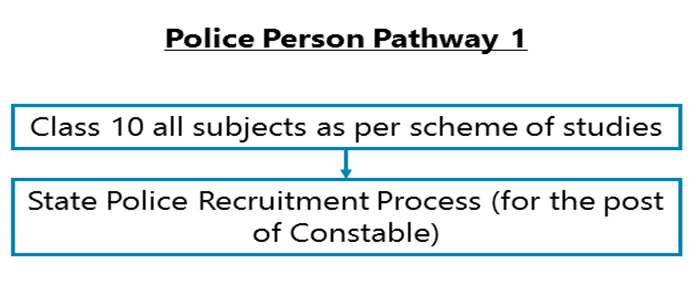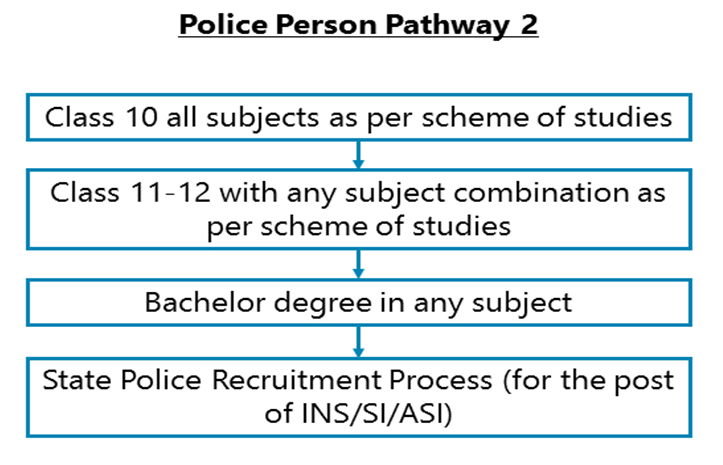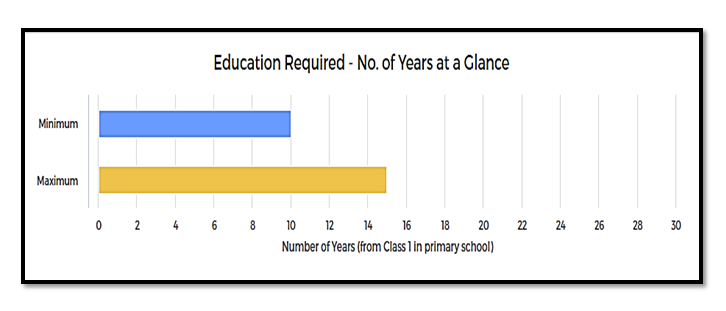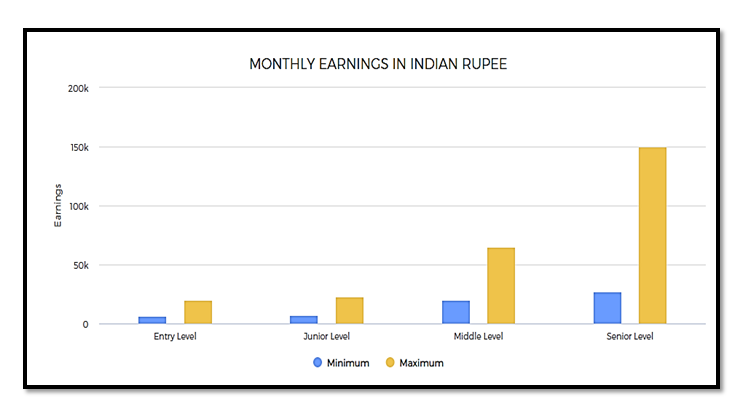Police Person
Entry Level Qualification
10
Career Fields
Government & Defense Services
For Specially Abled





Career Entrance Exam
About Career
PARTICULARS | DESCRIPTION |
Name | Police Person |
Purpose | Maintain Public Safety And Order |
Career Field | Government & Defense Services |
Required Entrance Exam | SSC CAPF, UP DAROGA, UP CONSTABLE, IB ACIO, UPSC IPS |
Average Salary | 100000 - 300000 Rs. Per Year |
Companies For You | Constable, Assistant Sub Inspector, Inspector & Many More |
Who is Eligible | Class 10th Pass |
1. As a Police Person, you will be expected to play a dynamic role in the society. Your prime duty will be to protect, uphold, and implement the laws of the country in a just and impartial manner. Since Police Persons have the dual responsibility of maintaining both law and order in the State or the Country as a whole and also investigate and bring the perpetrators of criminal activities to justice, their duties are numerous and diversified.
2. Your duties will include preventing crime, protecting people against criminal activities, controlling traffic, pursuing and arresting violators, investigating criminal cases, providing security to ministers and politicians, patrolling neighborhoods, responding to emergency calls promptly, writing case diaries, delivering warrants, submitting incident reports timely, and testifying in court cases as and when required, and much more.
Key roles and responsibilities
1. To uphold and enforce the law impartially, and to protect life, liberty, dignity and human rights of the people.
2. To provide security and to prevent and control criminal, terrorist, and communal activities.
3. To prevent a breach of communal harmony through any kind of unlawful and violent activities that affect the security of people.
4. To protect public properties including roads, railways, bridges, institutions, and establishments, etc., against acts of vandalism and violence.
5. To examine crime scenes, secure evidence, and interviewing witnesses. Also, to prepare reports based on such findings.
6. To minimize the occurrence of crimes through adequate preventive measures.
7. To register all complaints accurately whether they are registered in person or via phone calls and take prompt follow-up action to address the issue at hand.
8. To investigate all complaints and offenses brought to notice and duly supplying a copy of the First Information Report to the complainant.
9. To create, promote, and maintain a feeling of security in the community.
10. To provide all possible help to people in desperate situations arising out of natural or man-made disasters and to provide active assistance to agencies carrying out relief and rehabilitation measures.
11. To regulate traffic and facilitate orderly movement of pedestrians and vehicles on roads and highways.
12. To gather intelligence regarding all matters affecting public peace and security.
13. To take charge of all unclaimed property and take action for the safe custody and disposal in accordance with the standard procedure.
14. To train and motivate trainee and junior police personnel.
15. To discharge all powers and functions of the rank in an ethical and honest way.
Career Entry Pathway
Class 10 all subjects as per scheme of studies - State Police Recruitment Process (for the post of Constable)
After completing your secondary level school studies (class 10), you can apply for the job post of a Constable. The recruitment process is usually done in multiple stages including preliminary written exam, physical measurement test, physical efficiency test, final written exam, interview, verification, and then medical examination. If you are able to clear all these stages successfully, you will be recruited as a Constable under the State Police Service.
Class 10 all subjects as per scheme of studies – Class 11-12 with any subject combination as per scheme of studies - Bachelor degree in any subject - State Police Recruitment Process (for the post of INS/SI/ASI)
After completing your higher secondary level studies (class 11-12). Then you can apply for the job post of an Inspector/Sub Inspector/Assistant Sub Inspector. The recruitment process may either be conducted by the State Public Service Commision or the Staff Selection Commission. The recruitment process for these ranks is also done in multiple stages including written exam, physical measurement test, physical efficiency test, interview, verification, and then medical examination.
Required Qualification & Competencies
After completing Class 10, you can either try for the State or city police recruitment process (for the post of Constable) or you can complete your higher secondary studies (Class 11-12) and then complete your graduation. After graduating with a Bachelor’s degree in any subject, you can try for the State or city police recruitment process for the post of Assistant Sub Inspector (ASI) / Sub Inspector (SI) / Inspector of Police.
MINIMUM EDUCATION REQUIRED | MAXIMUM EDUCATION REQUIRED |
Post-Secondary Certificate / Diploma Programs for which the minimum eligibility is a pass in class X. | Under Graduate Undergraduate Degree / Honours Diploma / Graduate Diploma (equivalent to a Degree) Programs for which the minimum eligibility is a pass in Higher Secondary / Class XII School Leaving examination. |
Competencies Required
1. Conventional: You should have interests for Conventional Occupations. Conventional occupations involve repetitive and routine tasks as well as fixed processes or procedures for getting things done. These occupations involve working more with data, systems, and procedures and less with ideas or creativity.
2. Realistic: You should have interests for Realistic Occupations. Realistic occupations involve more practical and hands-on activities than paperwork or office work. Realistic occupations often involve physical activities for getting things done using various tools and equipment.
3. Investigative: You should have interests for Investigative Occupations. Investigative occupations involve working with ideas and quite a lot of thinking, often abstract or conceptual thinking. These involve learning about facts and figures; involve the use of data analysis, assessment of situations, decision making and problem-solving.
Personality traits
1. You are always or mostly organized in your day-to-day life and activities.
2. You are always or mostly careful about your actions and behavior.
3. You are always calm or generally remain calm in most situations.
4. You can always act independently or could do so in most situations.
Skills
1. Active Listening: Giving full attention to what other people are saying, understanding the points being made by others, asking questions, etc.
2. Critical Thinking: Skills in the analysis of complex situations, using logic and reasoning to understand the situations and take appropriate actions or make interpretations and inferences.
3. Coordination: Skills in working together with other people to get things done.
4. Problem Solving: Skills in analysis and understanding of problems, evaluating various options to solve the problems and using the best option to solve the problems.
5. Judgment and Decision Making: Skills in considering the pros and cons of various decision alternatives; considering costs and benefits; taking appropriate and suitable decisions.
6. Time Management: Skills in prioritizing work, managing time effectively.
7. Service Orientation: Skills in or a keen interest to help and assist people.
8. Persuasion: Skills in persuading others to change their minds or behavior.
Knowledge
1. Law: Knowledge of laws, legal codes, legal procedures, regulations, Government orders, etc.
2. Public Safety and Security: Knowledge of relevant equipment, policies, procedures, and strategies to maintain law and order situations, providing state or national security for protecting geographical territories, marine territories and sky from potential enemy attacks and protecting people and properties.
3. Administration: Knowledge of various administrative and operational functions in managing a business or an organization such as general administration, facility management, front office management, back office management, etc.
Career - Job Opportunities & Profiles
In this field, you will find numerous job opportunities at the state level that is either with the State Police or the City Police. The recruitment of this service is conducted and administered by the respective State Governments through State Public Service Commissions. Depending upon your rank (how you score in the overall selection process) you will be starting as a:
1. Constable, or
2. Assistant Sub Inspector, or
3. Sub Inspector, or
4. Inspector
Work Environment
The working conditions of a Police Person may involve both office work and field work. Police Persons usually work long hours nearing 10-12 hours a day, (sometimes even in extended night shifts in case of emergencies such as thefts, robberies, accidents, criminal cases, etc.) the work is both mentally and physically demanding and hence, can be stressful.
Career Growth
1. Police Constable (PC)
Police Constable is the lowest police rank in India and this rank has no shoulder insignia. All the police constables wear khaki-colored uniforms which indicate that he/she is a police officer.
2. Head Constable (HC)
Head Constables are just above Police constables. The rank of the Head Constable is the Indian equivalent of the Sergeant in foreign police forces. They wear three point-down chevrons on their sleeves or three bars on their epaulets.
3. Sub Inspector of Police & Assistant Sub-Inspector (SI & ASI)
A Sub Inspector of Police is just above the rank of the Assistant Sub-Inspector and below the rank of the Inspector. While a Sub Inspector has a two-star rank, an Assistant Sub-Inspector has a two-star rank.
4. Inspector of Police (INS)
In India, Inspectors of Police are officers who are in charge of a police station. They have the three-star insignia to indicate their position and they are high command officers.
Salary Offered
1. According to the 7th pay commission, the salary of the Constable is Rs.5,200-20,200 per month with additional grade pay of Rs.2000 and that of a Head Constable is Rs.5,200-20,200 with additional grade pay of Rs.2400.
2. The salary of an Assistant Sub Inspector is Rs.9,300-34,800 with additional grade pay of Rs.4200 and that of a Sub Inspector is Rs.9,300-34,800 with additional grade pay of Rs.4200. The salary of an Inspector is Rs.9,300-34,800 with additional grade pay of Rs.4600.
Monthly Earning In Indian Rupee
Entry Level | Junior Level | Mid-Level | Senior Level | |||||
Min Earning | Max Earning | Min Earning | Max Earning | Min Earning | Max Earning | Min Earning | Max Earning | |
6500 | 20000 | 7500 | 23000 | 20000 | 65000 | 27000 | 150000 | |
1. Entry level: 0 - 2 years of work experience
2. Junior Level: From 1 to 12 years of work experience
3. Mid-Level: From 5 to 20+ years of work experience
4. Senior Level: From 10 to 25+ years of work experience (there could be exceptions in some high-end technical, financial, engineering, creative, management, sports, and other careers; also in the near future, people will reach these levels much faster in many careers and in some careers, these levels will have no meaning as those careers will be completely tech skill driven such as even now, there is almost no level in a Cyber Security Expert’s job)
Work Activities
1. Getting Information and learning: Observing, hearing, reading, using computers, or otherwise obtaining information and learning from it.
2. Addressing grievances and resolving conflicts: Handling complaints and grievance to resolve; resolving conflicts among co-workers or others at the workplace or outside in relation to your work.
3. Assessing and determining compliance with standards, laws, rules, and guidelines: Using relevant information, auditing information, processes and systems to determine whether organizations or people are complying with standards, laws, rules, and guidelines.
4. Decision making and problem-solving: Analysis of data and information; evaluation of alternative decisions and results of decisions; taking the right decisions and solving problems.
5. Inspecting situations, events, and people: Inspecting situations, events, and people to understand the reasons and causes for the situation or events to happen; inspecting people to understand reasons behind their behavior and actions.
6. Identifying objects, actions, and events: Identifying various characteristics of objects; observing and understanding actions and events; understanding changes in actions and events.
7. Developing and maintaining interpersonal relationships: Developing professional relationships with co-workers and others outside organizations and maintaining good relationships.
8. Organizing, planning and prioritizing tasks: Planning and organizing tasks in order to achieve work goals; prioritizing tasks to achieve goals and making the best use of the time available.
9. Performing physical activities: Performing physical activities that require the use of your arms and legs and moving your whole body, such as climbing, lifting, balancing, walking, stooping, and handling of materials.
10. Handling administrative activities: Handling various administrative tasks and managing day-to-day operations.
Future Prospects
The recruitment process of Police Persons largely depends on the state ruling government’s policies and requirements for police personnel. However, every year, a significant number of vacancies and recruitment opportunities are available in the state government websites and portals.
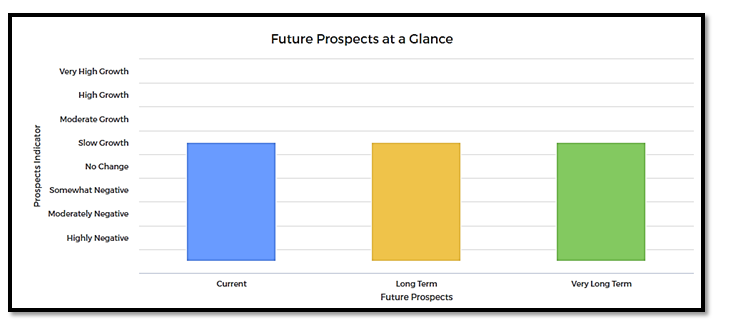
Future Prospects At A Glance
Current (0-1 year) | Long Term (2-5 year) | Very Long Term (6-10 years) |
Slow Growth | Slow Growth | Slow Growth |

